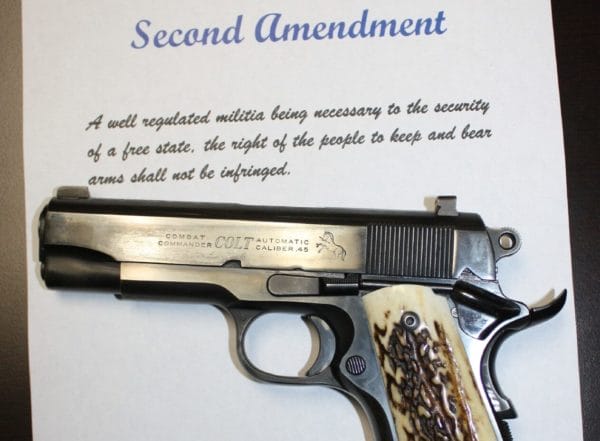
U.S.A. –-(AmmoLand.com)- On 15 May, 2015, a class-action lawsuit was filed against the government of the District of Columbia, for violating the constitutional rights of people who had been arrested before the Wrenn case was decided on July 25, 2021. The lawsuit was brought under the 1983 Civil Rights Act.
There originally were 10 claims. Judge Lambert struck down seven of those claims in May of 2019 in a memorandum and opinion.
Three claims, numbers I, III, and VI remained. On September 29, 2021, Judge Lambert granted summary judgment for the plaintiffs on claims I and III, and granted summary judgment for the defendants (the District of Columbia) on claim VI.
Summary judgment for the plaintiffs on claim number I, the Second Amendment reads:
In sum, the plaintiffs were arrested, detained, and had their guns seized under a gun control regime that completely banned carrying handguns in public. That fact is undisputed.
Accordingly, this Court finds that there is no genuine dispute of material fact as to the District’s liability on Claim 1. Construing the facts most favorably to the defendants, the District violated the plaintiffs’ Second Amendment rights by arresting them, detaining them, prosecuting them, and seizing their guns based on an unconstitutional set of D.C. laws. This Court will GRANT plaintiffs’ motion for a partial summary judgement and DENY the District’s motion for summary judgement as to liability on Count 1.
Claim number III, the Fifth Amendment claims, was about equal protection rights and the right to travel. Judge Lambert granted summary judgment for the plaintiffs on these points as well. From the decision:
B. There is No Genuine Dispute of Material Fact Regarding Plaintiffs Fifth Amendment Claims, and No Reasonable July Could Find for the District
Judge Lambert applies some excellent logic here. In short, the equal protection claims apply because the Second Amendment is a fundamental right, and the District of Columbia treated residents and non-residents very differently. Residents had the potential to obtain a permit, even if difficult. Non-residents did not have that option.
Judge Lambert notes the right to travel applies because non-residents were categorically denied the right to travel with firearms.
Unfortunately, Judge Lambert falls short when analyzing claim number VI, the Fourth Amendment claims. Judge Lambert writes, on page 18:
It is undisputed that basic registration requirements are constitutional. See Wrenn, 864 F.3d at 677 (“[T]raditional limits include, for instance, licensing requirements.”)
This is poor analysis. Licensing applies to people. Registration applies to firearms. Your car is registered. You are licensed. Licensing does not lend itself to government confiscation nearly as readily as registration of firearms does. There have been licenses to carry for a considerable period in a considerable number of states. This is not true for the registration of firearms, which is far more recent, uncommon, banned by federal law, and by state law in eight states. From Wrenn page 29:
At the Second Amendment’s core lies the right of responsible citizens to carry firearms for personal self-defense beyond the home, subject to longstanding restrictions. These traditional limits include, for instance, licensing requirements, but not bans on carrying in urban areas like D.C.or bans on carrying absent a special need for self–defense.
Registration of guns is illegal in several states. It is not certain all the victims of the District of Columbia’s unconstitutional gun control scheme could get their property back by showing gun registrations, when registering a gun may be illegal for some members of the class-action lawsuit.
The three specific laws mentioned in the class action lawsuit have been repealed. From thehill.com:
The three gun laws that the six plaintiffs were arrested under have all since been repealed.
William Claiborne, the attorney for the six plaintiffs, told The Washington Post that they “are very happy with the ruling, which completely vindicates their claim that they had a constitutional right to carry their handguns in public for self-defense.”
The District of Columbia continues to have some of the most restrictive firearms laws in the nation. Open carry is prohibited outside the home or a place of business, according to The Hill. A license is required to carry at all. There are numerous “gun-free” zones.
Analysis: the most interesting part of this decision is the precedent that governments can be sued for damages, stemming from infringements of Second Amendment rights under the 1983 Civil Rights act, and those rights are intrinsically wound together with the right to travel and equal protection under the law.
The decision could be appealed, but it may not be, by the District of Columbia. The Wrenn decision was not appealed. Those who want a disarmed population feared it would be upheld at the Supreme Court, establishing a precedent for the nation, instead of merely the District of Columbia.
The same fear applies in this case, more emphatically, with two new Supreme Court Justices appointed by President Trump, on the Court, since Wrenn.
About Dean Weingarten:
Dean Weingarten has been a peace officer, a military officer, was on the University of Wisconsin Pistol Team for four years, and was first certified to teach firearms safety in 1973. He taught the Arizona concealed carry course for fifteen years until the goal of Constitutional Carry was attained. He has degrees in meteorology and mining engineering, and retired from the Department of Defense after a 30 year career in Army Research, Development, Testing, and Evaluation.

